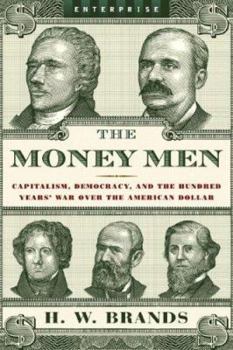The Money Men: Capitalism, Democracy, and the Hundred Years' War Over the American Dollar
Select Format
Select Condition 
Book Overview
From the first days of the United States, a battle raged over money. This text focuses on five 'Money Men' - Alexander Hamilton, Nicholas Biddle, Jay Cooke, Jay Gould, and J.P. Morgan - who fought over the lifeblood of American commerce and power.
Format:Hardcover
Language:English
ISBN:0393061841
ISBN13:9780393061840
Release Date:October 2006
Publisher:W. W. Norton & Company
Length:239 Pages
Weight:0.78 lbs.
Dimensions:0.8" x 5.8" x 8.2"
Customer Reviews
5 ratings
A history of American central banking
Published by Thriftbooks.com User , 16 years ago
It is VERY difficult to make an interesting book on the history of central banking and money in the US, especially without a pet agenda ("Bring back the gold standard!" or "Outlaw Central Banks!"). The Money Men contains American history, Economic history and Banking history, linked together in the stories of Alexander Hamilton, JP Morgan, and the powerful bankers between them. Does is succeed in being a page-turner? Not really - it's best read in several sittings. Does it avoid partisanship? Depends on the wording... While largely unbalanced, "Capitalism vs. Deomcracy" paints a biased view of the participants. "Capital driven democracy versus Economic populist democracy" could be less biased words. But all that said, the book certainly beats other alternatives of US central banking histories....
"The Money Men" intriguing ...
Published by Thriftbooks.com User , 17 years ago
I found this book to be a bit of a challenge, since it takes the reader through the history of U.S. money from before the nation's establishment as a country independent from the crown of England, and the accompanying tax structure, all the way through the Federal Reserve days of Alan Greenspan. Yet what I learned about the men profiled in this book gave me a glimpse of their "inner workings" and how their business - and personal - biases have had an affect on the entire development of the U.S. An excellent read.
Another great contribution from Dr. Brands
Published by Thriftbooks.com User , 17 years ago
Dr. Brands never disappoints. His research and witty style makes him a must-read in any topic on American history. Here, he's taken what some might consider a dry economics topic and turned it into a pleasurable experience that will help anyone understand this important current in the course of our country.
Brands Doesn't Disappoint
Published by Thriftbooks.com User , 17 years ago
I am a big fan of Bill Brands' work. He's one academic historian who can make complex subjects understandable to Average Joes like me. Unlike the previous reviewer, I don't have much background on the Money Question, which, as Brands explains, so deeply divided the nation for the first dozen or so decades of its existence. So this book was a learning experience for me. In "The Money Men," Brands elucidates five pivotal stories in America's economic development: *Hamilton's efforts to establish a national bank and his program to finance the developing country's growth through national debt *The Jackson-Biddle "War" in which Pres. Jackson prevailed in killing off the Second Bank of the United States *Jay Cooke's role in financing the Civil War *The failed attempt of railroad barons Jay Gould and James Fisk to corner the gold market *J.P. Morgan's role as the nation's de facto central banker. Of these, I was particularly drawn to the story about Cooke's innovations in selling Union war bonds to the general public. Major bankers, especially New York bankers, had shown only tepid appetite for such bonds amid Union battlefield setbacks. Indeed, except for Lincoln, Cooke may have been the man most responsible for keeping the Union army in the field. I was also surprised to learn -- as apparently were his contemporaries --of the relatively modest size of Morgan's estate: $68 million. By comparison, Andrew Carnegie amassed a $225 million fortune. Brands wraps up with the resolution to the Money Question -- the establishment of the Federal Reserve Bank in 1913. The Fed system was a compromise that combined elements of Hamiltonian capitalism and Jeffersonian democracy. With a couple of glaring exceptions (late 20s/early 30s and 1970s) the Fed system has served the nation's economy well across nine decades now.
THE MONEY MEN follows their lives, philosophies, clashes and lasting influences.
Published by Thriftbooks.com User , 18 years ago
The Money Men: Capitalism, Democracy and the Hundred Year's War Over the American Dollar charts the influence and struggles of the financial industry in American history, using biographical sketches of five key financiers to follow the story of the American dollar. Andrew Hamilton, Nicholas Biddle, Jay Cooke, Jay Gould and J.P. Morgan each helped form the monetary system in this country - and thus helped shape its political choices. THE MONEY MEN follows their lives, philosophies, clashes and lasting influences. Diane C. Donovan California Bookwatch






